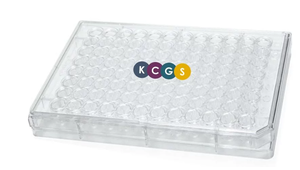Cat. #157681
The Kinase Chemogenomic Set (KCGS)
Cat. #: 157681
Unit size: 1 plate
Availability: 3-5 days
Application: The Kinase Chemogenomic Set (KCGS) can be used to study the biology of dark kinases from the human genome and uncover new molecular targets for drug discovery.
£2,700.00
This fee is applicable only for non-profit organisations. If you are a for-profit organisation or a researcher working on commercially-sponsored academic research, you will need to contact our licensing team for a commercial use license.
Contributor
Inventor: Tim Willson
Institute: The University of North Carolina at Chapel Hill ; Structural Genomics Consortium (SGC)
Tool Details
*FOR RESEARCH USE ONLY
- Tool name: The Kinase Chemogenomic Set (KCGS)
- Primary target: The list of kinases covered by the inhibitors in KCGS v1.0 and v2.0 can be found in the documentation section.
- Description: The Kinase Chemogenomic Set (KCGS) is a collection of narrow spectrum, small molecule kinase inhibitors that has been assembled by the SGC-UNC to study the biology of dark kinases. It is the most diverse and highly annotated, publicly-available collection of kinase inhibitors. Version 1.0 of the set contained 187 kinase inhibitors sourced from eight pharma companies and academic laboratories with potent activity on 215 human kinases. Version 2.0 has currently replaced version 1.0, it features 295 compounds in total and covers 262 kinases. Find out more on the release of KCGS v2.0 in this blog Sets like KCGS can help identify medically important kinases and allow the synthesis of high-quality chemical probes for high priority dark kinases of therapeutic interest. Dark kinases are those which are difficult to characterise, have little biological information gathered and their medical potential is unreached/untested. The goal of the KCGS is to generate, systematize and disseminate knowledge about dark kinases, biological networks in which they function and connections to cellular phenotypes and human disease. The KCGS aims to: (i) establish a knowledgebase covering the approximately 160 poorly understood dark kinases, (ii) distil primary data into functional biochemical and biological information and promote further research using genetic and chemical tools, which they are also developing and making available, (iii) place dark kinases within a new and emerging network-level understanding of cell signalling and physiology and (iv) identify those dark kinases whose mutation or mis-regulation is associated with human disease, making them possible therapeutic targets.
- Application: The Kinase Chemogenomic Set (KCGS) can be used to study the biology of dark kinases from the human genome and uncover new molecular targets for drug discovery.
- Additional notes: Each inhibitor has been screened across hundreds of kinases and only those meeting strict selective criteria are included in the set. For more information on KCGS or for commonly asked questions, please visit https://www.sgc-unc.org/faq.
Handling
- Storage conditions: -80° C
- Shipping conditions: Dry Ice
Target Details
- Primary target: The list of kinases covered by the inhibitors in KCGS v1.0 and v2.0 can be found in the documentation section.
Application Details
- Application: The Kinase Chemogenomic Set (KCGS) can be used to study the biology of dark kinases from the human genome and uncover new molecular targets for drug discovery.
References
- Blog on the release of KCGS v2.0
- KCGS FAQs
- Burdova et al. 2019. EMBO J. 38(20):e101443. PMID: 31424118.
- Wells et al. 2018. Medchemcomm. 9(1):44-66. PMID: 30108900.
- Drewry et al. 2017. PLoS One. 12(8):e0181585. PMID: 28767711.





